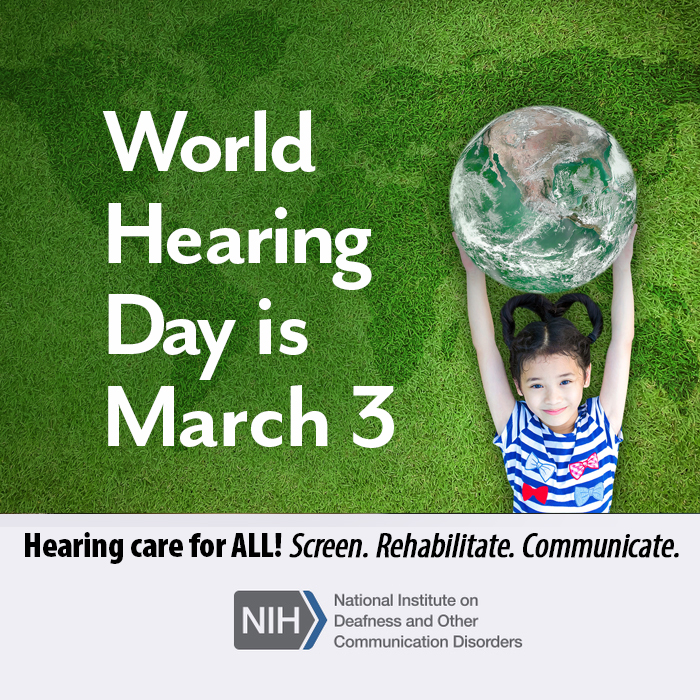
Click on the image or on this link-sharing page to use our social media sharing tools or embed the image in your website or blog. A Spanish-language version of this image is also available.
The National Institute on Deafness and Other Communication Disorders (NIDCD) joins the Centers for Disease Control and Prevention (CDC) and other stakeholders in the global hearing health and research communities to mark the launch of the first World Report on Hearing, a significant milestone for hearing health care around the world. Released by the World Health Organization (WHO) to coincide with World Hearing Day, March 3, 2021, the report underscores the broad and profound public health consequences that unaddressed hearing loss has on societies worldwide. Informed by international public health experts, the report aims to mobilize a coordinated and sustained global response, based on scientific best practices, to prioritize and improve access to patient-centered ear and hearing care.
More than 360 million people worldwide live with hearing loss that affects daily life. In the United States, approximately 15% of adults report some degree of hearing loss. According to the World Report on Hearing, the number of people living with hearing loss is expected to increase, given factors including an aging population, noise exposure, and untreated ear conditions such as middle ear infections (otitis media).
The report outlines its far-reaching goals in four sections:
- The Importance of Hearing Across the Life Course
- Solutions Across the Life Course: Hearing Loss Can Be Addressed
- Challenges Facing Ear and Hearing Care
- Designing the Way Forward: A Public Health Framework for Ear and Hearing Care
To help communities improve access to care, the World Report on Hearing offers a package of evidence-based interventions, abbreviated as H.E.A.R.I.N.G.:
- H: Hearing screening & intervention.
- E: Ear disease prevention & management.
- A: Access to technologies.
- R: Rehabilitation services.
- I: Improved communication.
- N: Noise reduction.
- G: Greater community engagement.
The World Hearing Forum comprises 138 agencies and organizations, including the NIDCD. This global network of stakeholders was engaged by WHO in 2018 to implement the report, in compliance with a World Health Assembly resolution on the prevention of deafness and hearing loss (PDF).
The release of the World Report on Hearing on March 3 reinforces this year’s World Hearing Day call to action: Hearing care for ALL! Screen. Rehabilitate. Communicate. Key messages developed by WHO as part of this year’s observance include:
- Good hearing and communication are important at all stages of life.
- Hearing loss and related ear diseases may be avoided through preventative actions, including protection against loud noise, good ear care practices, and immunization.
- Hearing loss and related ear diseases can be addressed when identified and cared for in a timely manner.
- People at risk for hearing loss should have their hearing checked regularly.
"The World Report on Hearing is a major accomplishment in raising awareness about global hearing health needs. It offers a way forward for communities struggling to address this major health care issue. We are proud of the NIDCD’s efforts to support research that improves accessible and affordable hearing health care, and we look forward to continued engagement," says NIDCD Director Debara L. Tucci, M.D., M.S., M.B.A.
- Seeking ways to predict, improve, and measure hearing health care outcomes.
- Working to develop safe and effective user-centered hearing aid fitting.
- Reducing disparities in access to hearing health care.
- Investigating how to improve delivery of care to people with hearing loss in their communities.
Current NIDCD-funded research also seeks to advance science to directly improve the lives of many with hearing loss and those with related medical conditions. Some examples include:
- Developing improved treatments for otitis media.
- Identifying and characterizing genes responsible for hereditary hearing impairment.
- Investigating gene therapy for treating hearing loss and dizziness.
- Researching improvements in assistive device technology to benefit those with hearing loss.
These NIDCD resources provide more information about hearing loss prevention and related topics:
- Adult Hearing Health Care
- It's a Noisy Planet. Protect Their Hearing.®
- Do You Need A Hearing Test?
- Hearing Protection: How to Use Formable Earplugs (video)

